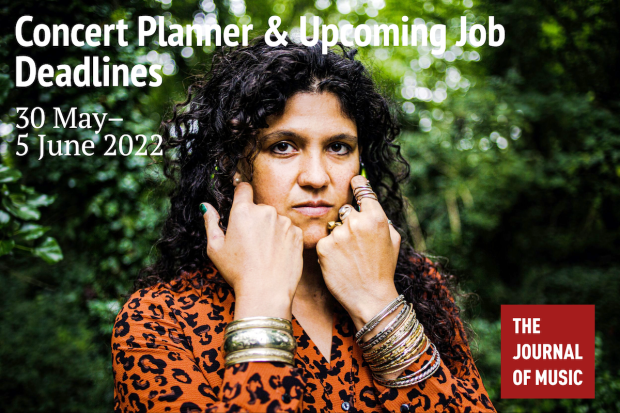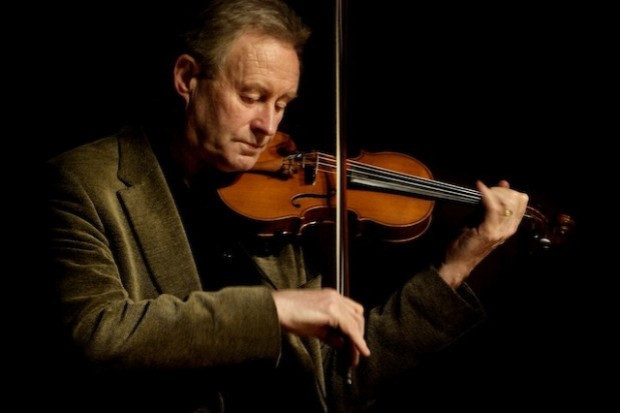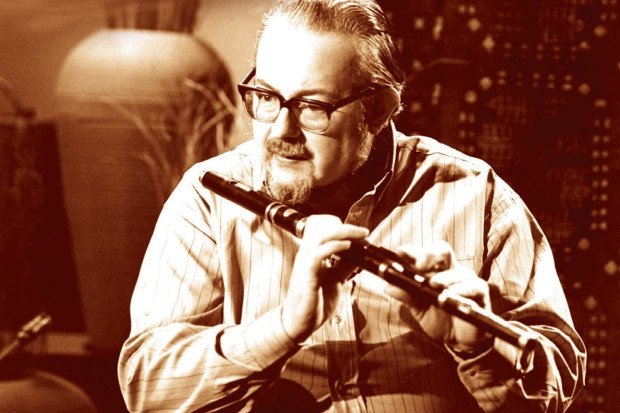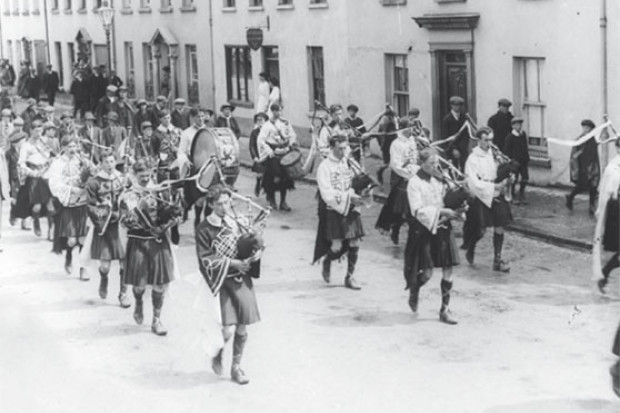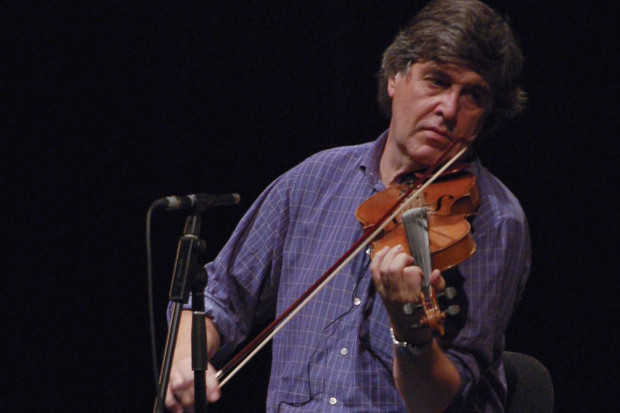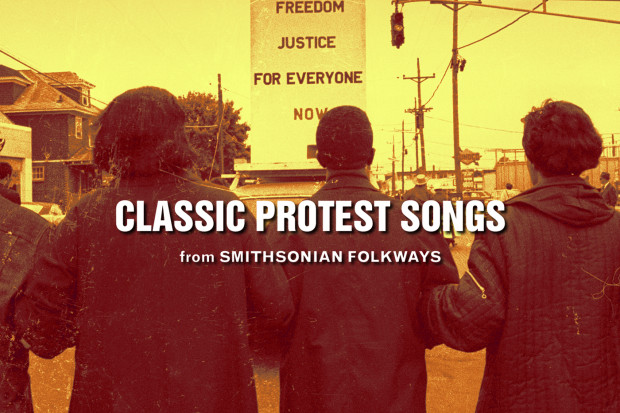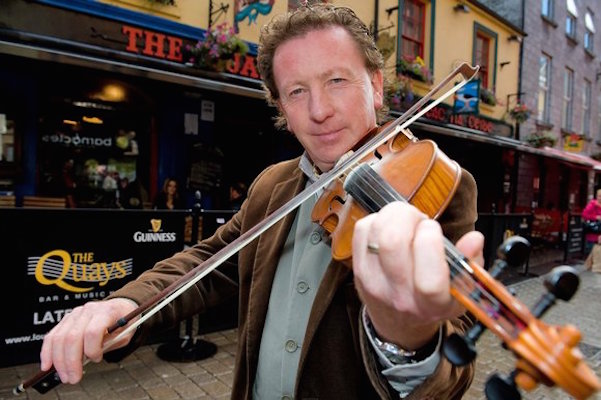
Frankie Gavin
An Interview with Fiddle-Player Frankie Gavin
TQ: Before we talk about your solo recordings and the Dé Danann years, just generally, what is your main musical focus at the moment?
FG: My primary focus is to complete a symphony that I started four or five years ago which has do with the Choctaw Indians. I’m an awful person for starting a project and then stopping half-way through if the funding runs out. I never got any funding for any project I’ve done, so generally speaking the funding does run out and you have to go out and do a few more gigs to bring in a few bob to keep things rolling. But I have actually begun on another project: I’m going to be playing with a major symphony orchestra in the United States, some Irish music, some classical. I have new management over there so it looks very likely that that will come about.
I also have a recording three-quarters finished, with Brian McGrath on banjo and Arty McGlynn on guitar, which is basically straight jigs, reels, hornpipes. It’s nearly completed and I’m very happy with it, but time restraints have delayed it. When that’s finished, I want to sit down and do a whole album of all my own original compositions. I think I’m in the type of emotional state at the moment which means I could do it quite well. I think for good music to come out of you, for some awful reason, you have to be in some sort of turmoil or other. At least I do anyway. Especially if you’re going to play or if you’re going to write something that’s going to be very deep and meaningful.
I started writing a couple of pieces recently and, well, I want to be cautious about the way I describe them, but they sounded fairly deep and emotional. If I could ever come up with an air as strong as something like ‘Róisín Dubh’ or Mise Éire I’d be very pleased with myself. And these tunes are along those lines, I think – I hope. I put two or three slow airs on the last album that I did, Fierce Traditional, and up to that point I had hardly ever played a slow air. That was as a consequence of my father’s death. When he passed away I suddenly got this desperate sense of guilt because he would always ask for a slow air. He loved slow airs, but the minute I’d start playing a slow air, he’d start crying and that’s why I’d always stop playing them. I didn’t want to see him crying, so I’d stop playing the airs.
TQ: And what age were you when that use to occur?
FG: That was as a child when I noticed. I wouldn’t play airs for that reason. He’d ask other people to play them if the opportunity arose. But the thing is that when he passed away I felt this dreadful sense of guilt about not having done him the courtesy of playing whatever number of slow airs he wanted, four or five times a week if needs be. Or at least sticking a few on an album here and there, which I never did. But for a long time I didn’t feel that I was able to play slow airs. I didn’t think I had the emotional wherewithal, the depth. I always played fast jigs and reels and that was my thing, but of late, maybe it’s getting older or whatever, but there’s great power in slow music, slow airs in particular.
TQ: You’re just forty-seven now and you were only eighteen when you founded the band De Danann. I read on the sleeve notes of the first De Dannan album that you were the youngest member of the band – so you were the youngest member, the founder and, by all accounts, the leader of it as well. That obviously reflects a lot of drive and ambition, but where does that ambition come from? Is it from your father?
FG: I have a great hunger for success and a great hunger to bring what I do to the bigger stage. That’s why I’m looking forward to working with this symphony orchestra. I’ve always had a vision as to where I want to be – and I’m not anywhere near where I’d like to be yet.
TQ: But that drive and that hunger, it has always set you apart. Were your parents like that? Is your family like that?
FG: No, no. I think being born with an infliction of any description – I have a hip problem which I’ve had since childbirth – has meant I got knocked around, mentally, psychologically, you name it. It made me a fighter. It made me say: ‘Fuck you pal’. The thing is that my determination doesn’t come from snobbery. My determination doesn’t come from, ‘I’m the greatest thing since fried bread’. My determination comes from wanting to push out the boat a bit farther and farther. I know if I’m in the right company, with the right musicians, that great things can happen. Sometimes if I’m playing with the likes of Brian and Arty I don’t even have to even think. The music just naturally starts playing on it’s own. I mean that in the most modest way possible. It just goes on to a plain where it floats and I could play for hours and I don’t have to think at all. But concentration has to be complete. I believe in total concentration when I’m playing. Mistakes are completely unacceptable as far as I’m concerned; blunders and wrong notes are unforgivable.
TQ: You’d be annoyed with yourself?
FG: I’d be raging. I hate it.
TQ: You’re a perfectionist?
FG: I’m afraid so. I can’t help it.
TQ: When learning to play the fiddle, I’ve read that Seán, your brother, who plays the accordion, had an influence – you were playing the whistle from the age of four and he encouraged you to pick up the fiddle at ten. But who taught you the actual techniques?
FG: My father used to play the fiddle and so did my mother. I was playing the fiddle for a while and then I decided I wanted to go and learn how to read music. So my mother found this fiddle teacher in Galway called Martin Rabbitte. He’s a wonderful person, himself a great fiddle player, although he doesn’t play the fiddle very often. I actually just went to learn how to read music, but when I played for him he said, ‘Hold on, you’re not actually holding the instrument properly at all’. I was cradling the fiddle in the palm of my hand and playing with the flats of my fingers. It was like the kiss of death so I basically had to stop. I was holding the bow wrong, playing really quiet, and it was all a big mess.
TQ: How long had you been playing for at that stage?
FG: A few years I’m sure. I was playing tunes. I wasn’t scraping. But I had to learn from the start and get my hand into the proper position. It meant a crucifying pain across the back of my hand and arm, but it was important and I had to do it. He said I was never going to be able to move up the finger board, that I would be restricted. So I was actually really learning the fiddle then. The most important thing I ever did when it comes to fiddle music was to go to Martin Rabbitte for those classes. He completely straightened me out on how to hold the bow and how to use it to bring as much level and volume out of the instrument as possible. He used to say, ‘You can always play quiet, but if you play quiet all the time you’ll never be able to hear yourself in a session and you won’t be able to contribute to an ensemble situation’. He was so, so right. I need to thank him for that here and now.
TQ: You must have progressed quite quickly. What fiddle players were you listening to?
FG: Sean McGuire, Tommy Peoples and Sean Keane, the Dublin fiddler. I liked the kind of thing the latter was doing with the piping and cranning techniques. I was doing that for a while myself – in the first album in particular, you can hear a bit of that. I was also listening to Tommy Potts. You can’t beat that fellah for incredible soul and imagination. I had the pleasure of being in Potts’ house once. Myself and Paul Brock went to his house years ago. I think it was a Sunday morning. He sat us in the front room and went off to the kitchen; you could hear him tuning up in there, and he came in and he played for about a half an hour. I swear to God, I cried my eyes out. It was unbelievable. I wouldn’t mind but Tommy Potts wasn’t given the respect he deserved, especially amongst his fellow Dublin musicians. He got a hard time from them because he played such weird and extraordinary music. I don’t think they could reach it or listen to it or cope with with what he was doing – his abilities, his fabulous imagination. Not that I can either, but I can grant him the greatest and utmost respect as an extraordinary individual. His impact is only kicking in now. His playing is so outrageous. It’s wonderful. It’s bizarre. It’s so creative and he’s such an artist. I can’t think of enough words to describe what I think of him.
TQ: And would you like to be able to ‘go there’ musically?
FG: I’d like to go to that area. I’m going to try and learn what he’s done and learn his mind frame if I can. That is something I’d love to do.
TQ: Your traditional music group, Dé Danann, began in the mid-seventies and, as the popular story goes, you were all playing together in Hughes’ pub in Spiddal in the mid-seventies and the band just naturally emerged. Can you tell me something about the atmosphere around those sessions in Galway in the mid-seventies?
FG: Well, not every pub in Galway would allow traditional music to be played then. I was teaching Liam Lewis, son of John and Breda Lewis, the fiddle around that time and John was doing a lot of work to try and generate sessions on a fairly regular basis. He’d pick me up at my house after school and I’d teach Liam for a while. Then we’d have a couple of tunes and we might have a session down in Hughes’ pub in Spiddal. Every Sunday morning there would also be a session and I remember there was an air of anticipation when myself, Charlie [Piggot], Alec [Finn] and Ringo [McDonagh] started playing the odd couple of tunes together. There was something in the air. You could feel the excitement, the enthusiasm, coming from people once the four of us played together. Somebody from one of the folk clubs in Dublin, either the Neptune Club or Slattery’s, was down in Hughes’ one Sunday morning and asked if the four of us would play at the folk club in Dublin. It didn’t really dawn on us that we were assembling a band together, but off we went and we did the gig and it was great – resounding applause and all the rest of it. We had no singer at the time, but I happened to know Dolores Keane and I gave her a call. She was delighted to join and off we went and did a first recording. It was just wonderful, a wonderful, wonderful time.
TQ: Only a year after Dé Danann’s first album in 1976, you recorded your first solo album, with Alec Finn on bouzouki, at the age of nineteen. Was that first solo album very important to you?
FG: Well, it was, but we did that album in a day and a half. What happened was that Richard Levins and Dan Collins of Seanachie Records had been back and forth to Ireland a few times and said, ‘We’d love for yourself and Alec to do something together’. So we were finishing a tour in Washington DC in 1976 and they booked a studio in New York. There was a lot of tunes that I was playing regularly in those days and we went into the studio and basically started in the morning – had the sandwiches delivered! – and finished about ten or eleven o’clock that night. Then the following day we went in and finished it off. I suppose myself and Alec had been playing the tunes regularly and we never really officially sat down and thought about doing an actual LP. So we were actually doing it before we really realised what we were doing or the implications of it.
TQ: And were you quite comfortable in the recording environment?
FG: Yes.
TQ: Straight away?
FG: Straight away. I’m more comfortable in a studio than anywhere else. I just love a recording studio.
TQ: How do you look back on that album now? Do you listen to it?
FG: I do, now that I’ve just located a copy of it again. It brings back all sorts of the fondest of memories. It’s like a diary in a way. Once you hear the tunes from the album, all sorts of things flash back through your mind. It’s lovely.
TQ: There were transcriptions of your playing included with that LP by Dan Collins. Did you think that was very strange, including four pages of transcriptions, going into great detail with regard to ornaments and variations and so on?
FG: Yes, I thought it was quite weird and I’ll tell you something else that was quite weird: on the sleeve of the LP it said, ‘If you want to hear more of the bouzouki, turn your balance to the left, and if you want to hear more of the fiddle, turn your balance button to the right’, which was ridiculous. I thought that was as kitsch as it comes really. And on the first print of that album, the ‘Pigeon on the Gate’ was on both sides of the LP. They put the same tune on twice by accident. So that’s a real collector’s album, whoever’s got it.
TQ: And what was the reaction in Ireland to that first solo album when you brought it out.
FG: I don’t know. It wouldn’t have had the impact of the De Danann stuff, for example, because it was just a solo album and I suppose solo music, with an accompanying instrument, still to this day can be a difficult thing to sell.
TQ: But amongst your peers, amongst other musicians, what was the reaction?
FG: Oh, well, amongst the musical fraternity, yes, resounding response altogether. More than I was aware of. More than I knew how to comprehend or understand. I never saw what we were doing as something absolutely fabulous.
TQ: After De Danann’s first couple of albums, there was then a spate of albums in which dynamic accordion and fiddle duets, with a quite unique sound, came to the fore, involving yourself and accordionists Jackie Daly, Mairtín O’Connor and Aidan Coffey. What were your influences in developing that sound?
FG: I was fascinated by the accordion because I had heard early recordings of P.J. Conlon, Joe Derrane and John J. Kimmel, those three in particular, all melodeon players, and I thought, ‘Good God, this is mighty music altogether’. I went out of my way to bring a load of recordings back from the States and gave them to Jackie Daly and Máirtín O’Connor. Jackie Daly was playing with Seamus Creagh at the time. The accordion was a scarce enough instrument then and there was a certain amount of disrespect for it up to about that period. I think the accordion, with the exception of players like Joe Burke, for example, and Paddy O’Brien, had a bad reputation, but I think that has changed a lot now over the last twenty or thirty years. Alec and myself went down to the late Joe Galligan’s folk-club just outside of Ennis and Jackie was playing there. The express purpose for going down there was to get Jackie to join the band, but we knew it would be a disruption to himself and Seamus Creagh because they had been playing together. So we were concerned about that. We didn’t want to be dividing a very good thing. Seamus and Jackie used to play so good together. But Jackie was compatible to the kind of music we played in the band. He was ideal.
TQ: Jackie Daly played on one of your most successful albums – The Star Spangled Molloy, which included your version of ‘Hey Jude’. How did that version come about?
FG: Alec had that idea of doing an Irish version of ‘Hey Jude’. I remember Jackie Daly was categorically against it. He hated it. He thought it was a complete sell-out, and yet he wrote the reel that follows it! I remember the first time we actually played it. It was in Holland and the crowd went absolutely bonkers. Then of course it was a great idea! It was no longer a daft idea or a sell-out or anything else. But what it did was rope in a lot of people that wouldn’t bother their hat listening to Irish music.
TQ: Are you proud of that?
FG: Absolutely. I mean the more you can bring in to the fold of listening to Irish traditional music, the better. Everybody pretty much loves Irish traditional music nowadays. It’s great.
TQ: Do you think De Danann played a large part in that?
FG: I hope so. I quietly think so – yes I certainly hope so.
TQ: Twelve years after your first solo album in 1977, which you never really set out to make, you made your second solo fiddle album, Frankie Goes to Town. What made you decide to make another solo album?
FG: I don’t know. The part that I find most embarrassing about the solo element of my career in general is that I’ve only actually got three fiddle albums and one flute album done at this point, over a period of thirty years. I’m ashamed that I haven’t done more. But now with this new four-CD set that’s out, and the new recording with Arty and Brian, I’m certainly doing the best I can to make up for lost time.
I like the Frankie goes to Town album and there’s some good spots in it, but there aren’t as many good spots in it as there are on the first one, not by a long shot. I think it was more that I needed to do a solo album. I needed to rather than dying to or longing to. I mean, it’s a nice album. Charlie Lennon is playing very nice on it and there’s a couple of nice selections of tunes, but I think the fact that De Danann is pretty much gone at this stage has got me to really re-focus and re-think. I’ve been managing the band for longer than I care to remember, and the thing is, that has been consuming all of my time. That would be another major reason why I wouldn’t have recorded. I’ve been doing a full-time job when everybody else would just show up at the airport. I’d be always on the phone or the fax or the internet and all the rest of it. I’m kind of glad that’s stopped.
TQ: After Frankie goes to Town, some of your 1990s recordings seemed to demonstrate a new level of virtuousity on your playing, almost as if you had upped a gear. I’m thinking in particular of your 1996 album Irlande and some miscellaneous recordings such as those on the Bringing it all Back Home and River of Sound albums. Was there a reason for that change of approach?
FG: Well, as one of the lads in the band said when we did gigs with just Alec [Finn], Brian [McGrath], Colm [Murphy] and myself – the four of us and a singer – when I was the only lead instrument as such, it seemed to come back to the old De Danann sound and you could actually hear more of the fiddle. With the accordion it seemed to get swamped a bit. Now that I’m back into more solo work, the more demands I put on myself. Maybe the virtuosity needs an opportunity to explode here and there. I don’t know. I don’t know how to explain it.
TQ: Are you conscious of the influence that your recordings have had on other fiddle players?
FG: Not so much when I hear other fiddle players playing but more by word of mouth. People would make comments to me with regards to the music and how it has influenced them. I don’t necessarily hear a lot of clones. There’s a few around but not as many as Matt Molloy has!
TQ: But the colouring in traditional fiddle playing – counter melodies, double stopping and so on – aspects of which you have more or less introduced, do you hear much of that in other musicians?
FG: Yes, the colouring. Yes, I hear people do the colouring all right. Rather than people playing exactly like I do, I’ll hear the music and the chord stops and double stops and stuff like that. Yes, I’d hear a lot of that all right and that’s nice. Well, I think it’s a wonderful compliment. It’s as nice as somebody coming up to you in the street and saying something very nice to you. It can only be registered as a fabulous compliment.
TQ: You are always emphasising audience participation in your live recordings. I guess you want everybody to have a great time at your concerts, but is it as simple as that or is there something more? Do you really need the audience participation for you to get the most out of the concert?
FG: I’ll play far better if I can soften their cough in the first three or four minutes. If you can get them behind you as early as possible in a gig, it’s not work anymore. It’s just pure pleasure after that. If an audience are stiff and frozen and you don’t communicate with them, your going to work a lot harder, then you’ll make mistakes and that’s back to the start of things I hate. So I feel it’s vital to try and deliver some sort of warmth and personality to people as early as possible and make them feel comfortable in your company.
TQ: Can you get very frustrated with audiences or with yourself if you don’t ‘soften their cough’?
FG: Yeah, it’s deeply uncomfortable. You’ll show it either by silly nervous remarks that you make or you’ll do silly things with your music, or you make some stupid comment in the interest of trying to be funny and it can go also horribly wrong.
TQ: Have there been some nightmare gigs?
FG: A few yeah. I remember once we went to Manchester with the full complement of De Danann. There was about fifteen people in the second row and they were mostly related to the man that was running the gig. Nobody knew about it. It was just badly promoted. We said, ‘What’ll we do?’, and we had a huge row of course. ‘You’re not going’, ‘I’m not going’, effing this and effing that. Anyway out we went…
TQ: Which side were you on?
FG: Well I went back and forth for a while.
TQ: Would you be the one who would try to broker a deal?
FG: Well, I thought we should do it, regardless.
TQ: Who would be the one in the band who would broker the deal?
FG: Well, democracies don’t work in a band. Let’s be clear about that from the word go. Forget about democracy. Asking everyone their opinion is fatal. I mean they’re just voicing their opinion just to be awkward. I’m not saying that the people in the band were awkward – we were all awkward in our own ways once in a while, but as I say, democracy doesn’t work. You need somebody to lead the team and that’s that. Now, you might be making all the wrong choices but you have to give leadership. If you don’t, everyone’s lost.
TQ: Are you saying that’s your role?
FG: Well, I just took it on. You can’t be up on stage and not know what we should play next. And then, no matter how good that particular piece is, if you have lack of concentration for fifteen seconds after that good piece, you’ve lost your crowd and you have to start all over again. That leadership thing, I felt was something I had to do. I mean nobody was pushing me to do it but I just wound up doing it I suppose.
TQ: How did that gig go?
FG: Absolutely incredible. It was amazing. There was only like fifteen or twenty people in the audience and they went absolutely bloody bonkers.
TQ: So regarding audiences – Irish audiences, audiences abroad – any preferences?
FG: I think we get a great audience in America. The people who follow Irish music in the US or follow traditional music or folk music or ethnic music of any description, they really follow it. They really are out there to listen. They’re one hundred per cent genuine in their enthusiasm. They want to hear you talk. They want to hear you play. They want you to be happy when you’re playing. They buy your albums, and they’re totally genuine and dedicated to being a follower. Irish people, I think, have it nice and easy; they have a sarcastic sort of attitude towards their own people and their own music.
TQ: Would you like to tell me what you think of traditional music in 2004?
FG: I hear too much trendy shit. I’m hearing too much crap, phoney Irish music and people just filling in the spaces, just trendying it up to the Celtic cataclysmic orgasm that it’s not. It makes me sick. I hate it. I’m a firm believer in the idea that if you’re going to play Irish music, try and play it right, but don’t screw with it. Don’t start this business of ‘Let’s see how much we can really screw with this tune’, turning an Irish jig or reel into jazz and making a complete dog’s dinner out of two types of music at the same time. I hate that. They’re trying to make some sort of statement. They’re trying to attract attention to themselves. That’s all they’re doing. It’s nothing to do with trying to make music interesting. I might sound like a complete old crank here, but it does nothing for me when I see people leaping about on the stage playing reels and jigs, with four drum-kits behind them and cymbals and chimes and all this rubbish. Good grief. Pick another music and screw with that. Gay Byrne slagged me one night about this and he said, ‘You know, this is all a big boiling pot, you have to live and let live. Everyone has their own taste’. Fine, they can have their own taste. I don’t want to listen to it. I can’t cope with it. Irish traditional music is wonderful music. It doesn’t need to be screwed with to the degree that I’m hearing.
TQ: Have you ever been accused of screwing with traditional music?
FG: I think we got a bollicking when we did ‘Hey Jude’, but my only answer to that was, well, we played a pop tune in as Irish a fashion as we possibly could, as opposed to playing an Irish tune in a pop fashion. There’s a big difference. We took a piece of Jewish music and made that into an Irish tune. We put our own stamp on it. Look at the delivery Dolores Keane did of ‘Let it Be’. She almost made it into an Irish folk song. It’s so beautifully done. It’s as good, if not better, than the original.
TQ: Is that what you were trying to do with your Christmas album? Taking well-known tunes and putting an Irish stamp on them?
FG: Yes. Obviously you’re playing all the hymns and stuff that you’re familiar with as children, and I thought it would be nice to do that and threw a couple of tunes in there with a bit of orchestral backing. The Christmas album is commercial. It’s a commercial thing, but I don’t think there’s anything incredibly distasteful about it. At least I hope there isn’t. I think the cover is nice. I think the music is nice. I think it captures the atmosphere of Christmas and I think it’ll come up every Christmas. I hope people like it. I would shudder to think it’s on the vulgar side of life.
TQ: You evidently thrive on trying out new things. Are you excited about your fiddle playing into the future?
FG: Yes I am. Now that I have my musical focus a bit clearer I think there are great times ahead for me from a personal performance point of view. I think that I won’t be happy until I’ve learned Tchaikovsky’s violin concerto and can play it off the top of my head! Then I’ll be happy.
Published on 1 March 2004
Toner Quinn is Editor of the Journal of Music. His new book, What Ireland Can Teach the World About Music, is available here. Toner will be giving a lecture exploring some of the ideas in the book on Saturday 11 May 2024 at 3pm at Farmleigh House in Dublin. For booking, visit https://bit.ly/3x2yCL8.










